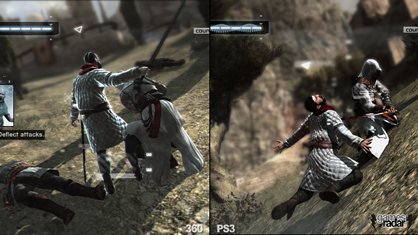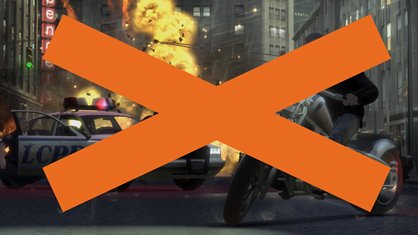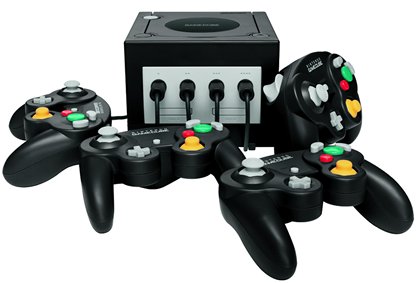10 reasons to hate every console
No system is safe as we rip into each game machine on today's market

It’s still too expensive: Yes, we know: the PS3 includes a Blu-ray player, and those are often even more expensive than the console itself. We’re also aware it packs in WiFi connectivity, uses a standard hard drive that can be replaced relatively cheaply and has media-hub features that make the 360 look like a baby toy. But you know what? If you just want a machine that plays games, none of that counts for a damn thing when there’s a $100 price difference between the cheapest PS3 and a mid-range Xbox 360. Especially not when…
There’s very little difference between 360 and PS3 games: Whenever a high-profile, multi-platform game is released, every game journalist with video-capture equipment scrambles to put together a 360/PS3 comparison video. And nine times out of 10, the only visible difference is a slight variation in the color palettes.

Above: It's just one example, but can YOU tell the difference?
Look, we’ve heard for years that the PS3’s capabilities are light-years beyond the 360’s, and we’ve seen PS3 tech demos that went way beyond what we would have guessed was possible on a console. So why hasn’t that tech made it into the games yet? Why isn’t the PS3 blowing the doors off the best the 360 has to offer?
It’s as simple as this: for $100 more, we expect to get at least an extra hundred dollars’ worth of awesome. But so far that hasn’t come through in the games, and what by all rights should be an obvious technical edge on par with the one the Super Nintendo had over the Genesis instead feels more like comparing the Wii’s graphics to the PS2’s.

Home is awful: When Sony unveiled its Home service in 2007, we were immediately interested, and as it was delayed and altered over the following year, we only got more interested. But looking back, it’s difficult to understand why. Home’s promise as a virtual world was doomed the minute Sony put its marketing department in charge of the project, and what could have been a fun place to hang out online instead turned into a stylized, IKEA-flavorednightmare world that gave players the opportunity to exchange real money for fake t-shirts. As a matchmaking service, it puts an unnecessary layer of interactivity between you and the game, and as a virtual world its standout features are sponsored ad-spaces and a selection of crummy minigames that you have to stand in line to play.

On the other hand, it’s free.
Blu-ray load times are slower: There’s no question that Blu-ray is an impressive format, considering that it packs in about six times the capacity of a standard DVD. So far, though, a lot of games haven’t really benefited from all that storage, and the medium’s size apparently means it takes a little longer for the drive to search through. The solution to this problem, unsurprisingly, has led to another problem:
Mandatory installations are a drag: Remember when having to install games to your hard drive was something only PC users had to worry about? Those days are long gone, and it seems like every PS3 game we get these days makes us sit through a lengthy installation the first time we boot it up. These can be short, or they can run upwards of 20-30 minutes, and the games that take the longest tend to be the ones least worth waiting for.

Above: The rare exception to that rule
Those installations also take up a hefty amount of space, meaning you’ll have to wade through and weed out your old ones when a new game tells you your hard drive is full.
Sign up to the GamesRadar+ Newsletter
Weekly digests, tales from the communities you love, and more
Sony doesn’t pay for platform exclusives: Remember what we said about Microsoft paying for exclusives? It’s a dick move, sure, but before you go demonizing the company for being underhanded, remember that videogames are a business, and that Sony could easily do the same thing.

Above: NO THIS IS NOT FOR YOU
Really, the only thing stopping Sony from paying a company like Rockstar or Bethesda to develop PS3 exclusives is that it doesn’t want to. Now ask yourself: is Sony really showing integrity by not shelling out cash when Microsoft will, or is it just doing a disservice to its customers?
Support for Trophies is still patchy: More and more games are adopting Sony’s Trophies, but support for them isn’t mandatory like Microsoft’s Achievements, and so some games still ship without them, or add them later. Granted, incentives like Trophies and Achievements might be meaningless, but they’re fun to collect and compare with friends (and to quietly admire when nobody’s looking). And to be honest, once you get hooked on them, playing games can feel like a waste of time without the promise of a little reward every time you do something cool.

Above: Hey, remember this?
And while we’re on the topic, whatever happened to the big-ass Trophy display rooms Sony was going to give us in Home? Apparently that’s still on its way, although it’ll be interesting to see how many companies are really onboard with the idea of creating displayable 3D models to represent each and every one of a given game’s Trophies.
Exclusives tend to come from one source: On paper, the PS3 boasted a killer lineup of kickass exclusive games in 2008. If you subtract all the titles published by Sony itself, however, you’re left with just two notable ones: Haze, one of the most disappointing games of the year; and Metal Gear Solid 4, easily one of the best. Apart from MGS4, every last one of the PS3’s best games have come directly from Sony, which has picked up the third-party publishing slack like no other console maker in recent memory.

Killzone 2? Sony. LittleBigPlanet? Sony. Ratchet & Clank Future, Uncharted, The Last Guy, Flower, Heavenly Sword, PAIN, inFamous, God of War III and Resistance 2? All published, or about to be published, by Sony. Even the disappointing MotorStorm: Pacific Rift came straight from Sony.
Now, that might give the impression that we’re ripping on Sony for being a powerhouse publisher, but really it’s just that we don’t think it’s a good indicator of a console’s health when its most prominent games are all produced by the company that makes the machine. That’s like… well, where have we seen that before?

Above: OH SNAP WE JUST WENT THERE
Harsh, we know. But this is a Week of Hate article.
Sixaxis never really panned out: Have you ever played a game in which the Sixaxis motion controls felt completely natural and weren’t either a gimmick or an outright hindrance to the gameplay? We sure as hell haven’t, but for whatever reason, Sony thought its seldom-used, me-too motion controls were just the thing to make its customers forget all about those troublesome rumble features.

Above: Hey, remember what a great idea this was?
It was an interesting idea, but once it was clear that neither gamers nor developers were really taking the bait, Sony should have wasted a little less time bringing the inevitable DualShock 3 to market.
Firmware updates: Man, these things are just awful. They don’t pop up with the frequency that they used to ,but having to drop everything to download an update, wait for it to install and then restart your system is almost as much of a drag as waiting for a mandatory installation for a crappy game.



